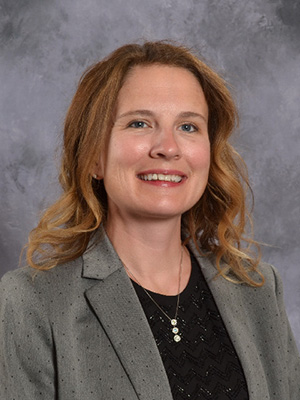
Maureen Ford, MD, understands the stigma that often surrounds substance use and how difficult it can be to seek help.
Dr. Ford also knows medications and harm reduction can make a difference – by reducing cravings, minimizing withdrawal, and preventing harm to one’s health.
An assistant professor in WMed’s Department of Emergency Medicine and an emergency medicine physician for Bronson Healthcare, Dr. Ford is now working to address what she believes is a critical need in the community with a dedicated clinic with treatment options for those struggling with substance use and other addictions.
Dr. Ford, who is board certified in addiction medicine through the American Board of Preventative Medicine, began seeing patients last fall at the new WMed Health Substance Use Treatment practice, housed within the WMed Health Family Medicine Crosstown Parkway practice at 555 W. Crosstown Parkway.
The substance use treatment clinic is open from 8 a.m. to 5 p.m. Monday through Friday and is currently accepting new patients.
“Our goal at the WMed Family Medicine Substance Use Treatment clinic is to be low barrier and let people come talk to me, or one of our other doctors, to share what they are experiencing and learn what the options are for treatment and harm reduction related to their substance use,” Dr. Ford said. “We want to meet people where they are.
“So much of substance use treatment has all these very rigid requirements ... and often people give up,” Dr. Ford added. “Being integrated in the family medicine clinic, we want to remove the stigma and simply treat substance use disorders like other medical problems.”
The Substance Use Treatment Clinic has treatment options available for:
- Opioid use (heroin, fentanyl, pills)
- Alcohol use
- Marijuana use
- Stimulant use (cocaine, methamphetamine)
- Tobacco use
- Vaping (marijuana, nicotine)
- Behavioral addictions (e.g. gambling, gaming)
- Inhalants (nitrous oxide)
Medications available at the clinic include:
- Buprenorphine: Sublingual (Suboxone/Subutex) and injectable (Sublocade)
- Naltrexone: Oral and injectable (Vivitrol)
- Varenicline (Chantix), Bupropion (Zyban), and nicotine replacement
- Referral to counseling and other resources also available, but not required, for medical treatment
“Abstinence is not a requirement for treatment at our clinic,” Dr. Ford said. “People think, ‘I've got to hit rock bottom,’ before getting help. That is the way our system has functioned, until your substance use is so bad you have to leave your life for rehab it’s hard to get help. That is why only 1 in 10 people with substance use disorder are getting treatment. It shouldn’t be that hard, you should be able to talk to a doctor about this medical problem at regular medical visit just like you can other medical problems.”
The substance use treatment clinic also provides educational opportunities for the next generation of physicians, according to Dr. Ford. Family Medicine residents are currently also seeing patients in the clinic under the supervision of Dr. Ford or another board-certified physician, and there are also efforts underway to establish elective rotations for medical students and residents as well as an addiction medicine fellowship program.
“Addiction medicine specialists are needed in every field,” Dr. Ford said. “You can be an OB-GYN physician, a family or internal medicine doc, or a surgeon and apply to addiction medicine fellowship at the end of your residency; it's relevant for all of us. Addiction medicine fellows will spend one year training in addiction medicine with protected time to maintain their primary specialty certification.”
Overall, Dr. Ford is grateful for the opportunity to integrate addiction medicine services into the family medicine clinic as “it’s incredibly rewarding to see people, as they’re engaged in treatment, doing well and getting their lives back on track," she said.
Dr. Ford encourages people struggling with substance use to be open to visiting the clinic, where they can be evaluated and have an honest conversation with a doctor, free of judgment.
“It's very painful when people are suffering that way, they can feel very alone and isolated, but I think if people could just say, ‘Go see that doctor. You're not committing to anything. Just have a chat,’ it would make a difference. We're not going to get everyone to come in to succeed, but even if we get 25 percent of people to try treatment with medication and they meet their goals, whether that is cutting down or completely stopping their use, it’s worth it.”
For more information about the WMed Substance Use Treatment Clinic, call 269.585.0200 or email fmclinic@wmed.edu.
For harm reduction supplies or a free naloxone opioid overdose kit, call COPE Network at 269.580.8290. For other naloxone access in Michigan, you can visit the Michigan SUD resources naloxone page.
